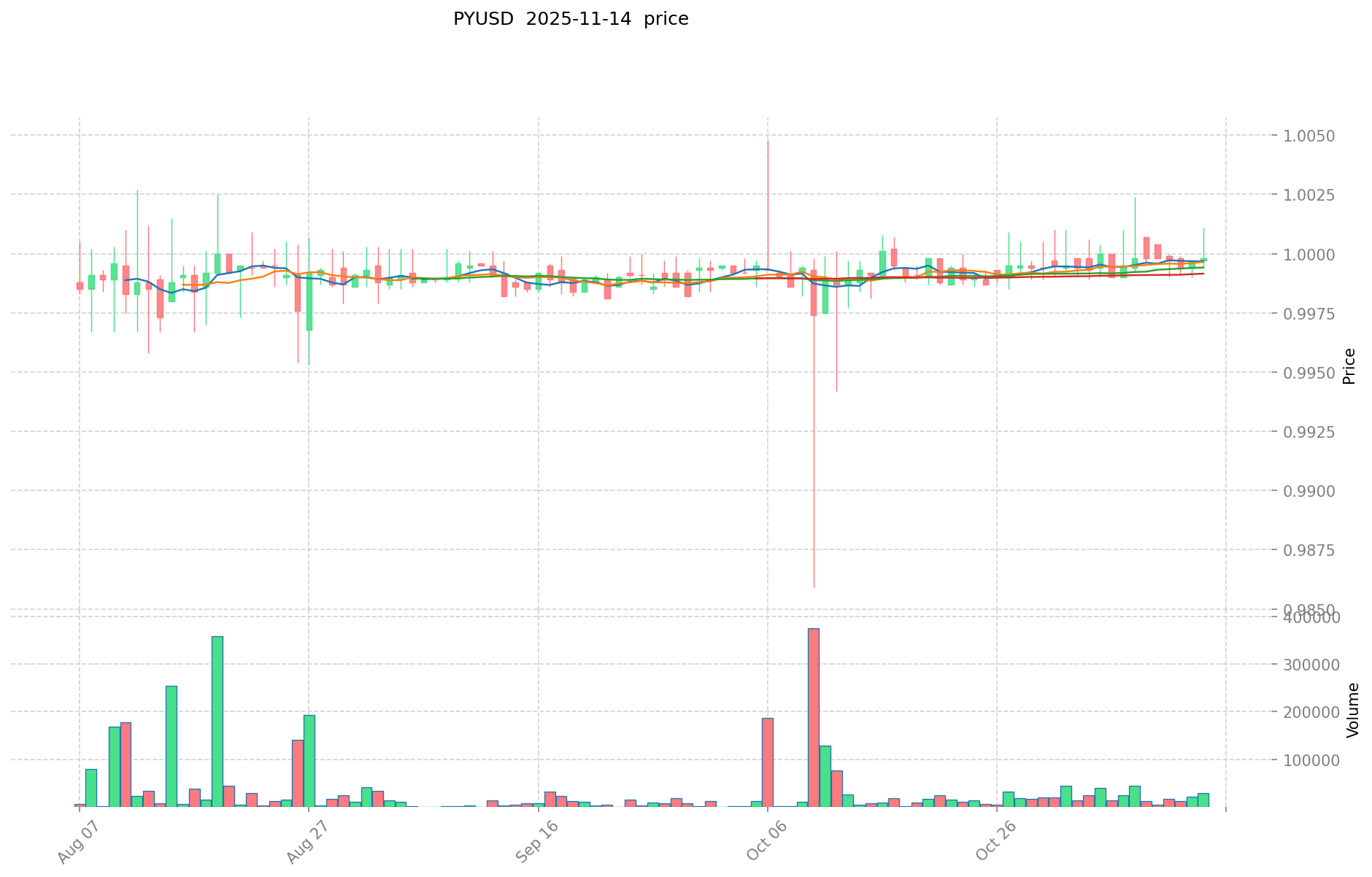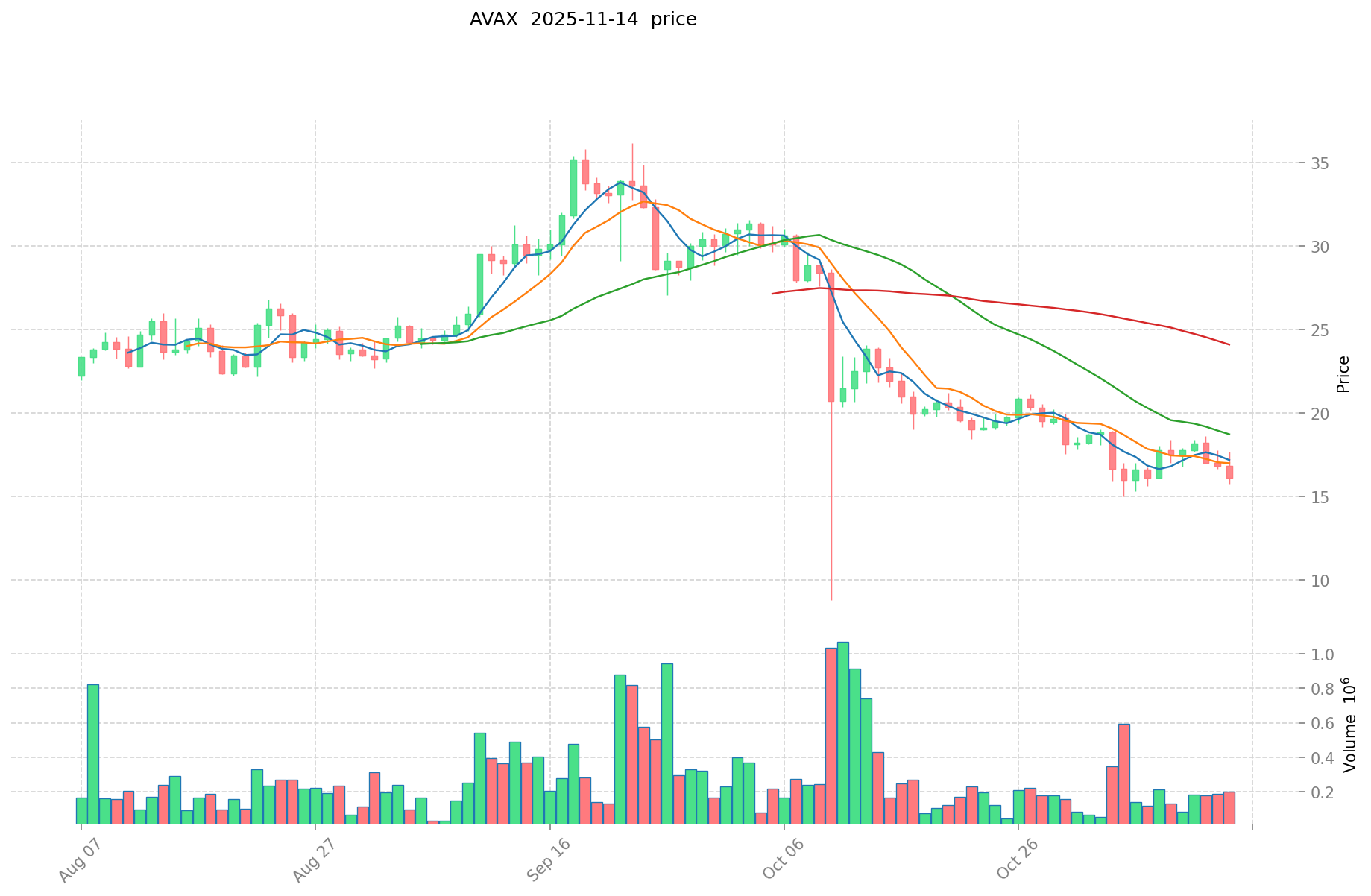PYUSD vs AVAX: The Battle of Stablecoins and Smart Contract Platforms in the Crypto Arena
Introduction: Investment Comparison of PYUSD vs AVAX
In the cryptocurrency market, the comparison between PayPal USD (PYUSD) vs Avalanche (AVAX) has been an unavoidable topic for investors. The two not only differ significantly in market cap ranking, application scenarios, and price performance, but also represent different positioning in the crypto asset space.
PayPal USD (PYUSD): Since its launch, it has gained market recognition for its role as a stablecoin designed for payment opportunities.
Avalanche (AVAX): Since its inception in 2020, it has been hailed as a platform for launching decentralized applications and interoperable blockchains, becoming one of the cryptocurrencies with significant global trading volume and market capitalization.
This article will comprehensively analyze the investment value comparison between PYUSD and AVAX, focusing on historical price trends, supply mechanisms, institutional adoption, technological ecosystems, and future predictions, attempting to answer the question most concerning to investors:
"Which is the better buy right now?"
I. Price History Comparison and Current Market Status
PYUSD and AVAX Historical Price Trends
- 2023: PYUSD was launched and maintained a stable price around $1 due to its stablecoin nature.
- 2021: AVAX reached its all-time high of $144.96 on November 21, 2021, during the crypto bull market.
- Comparative analysis: While PYUSD has maintained stability around $1, AVAX has experienced significant volatility, dropping from its all-time high of $144.96 to current levels.
Current Market Situation (2025-11-14)
- PYUSD current price: $0.9999
- AVAX current price: $15.32
- 24-hour trading volume: PYUSD $33,713.92 vs AVAX $3,763,613.74
- Market Sentiment Index (Fear & Greed Index): 16 (Extreme Fear)
Click to view real-time prices:
- Check PYUSD current price Market Price
- Check AVAX current price Market Price
II. Project Overview and Technology Comparison
PYUSD (PayPal USD)
- Purpose: Designed to contribute to stablecoin payment opportunities
- Backing: 100% backed by U.S. dollar deposits, short-term U.S Treasuries, and similar cash equivalents
- Issuer: Paxos Trust Company
- Key feature: Redeemable 1:1 for U.S. dollars
AVAX (Avalanche)
- Type: Open-source platform for decentralized applications and interoperable blockchains
- Consensus: Uses a revolutionary consensus protocol
- Performance: Enables smart contracts with 1-second transaction finality
- Compatibility: Compatible with Ethereum toolkit
- Founders: Emin Gün Sirer, Kevin Sekniqi, and Ted Yin
Technical Comparison
- PYUSD focuses on stability and payment use cases, while AVAX aims to provide a high-performance blockchain platform.
- PYUSD operates on existing blockchain networks, whereas AVAX has its own proprietary blockchain and consensus mechanism.
- AVAX offers smart contract functionality and supports decentralized applications, which is not a primary focus for PYUSD.
III. Market Performance Analysis
Market Capitalization and Ranking
- PYUSD: $3,408,593,301 (Rank 40)
- AVAX: $6,568,768,414 (Rank 28)
Supply and Circulation
- PYUSD:
- Circulating Supply: 3,408,934,194
- Total Supply: 967,614,865
- Max Supply: Unlimited
- AVAX:
- Circulating Supply: 428,770,784
- Total Supply: 460,439,871
- Max Supply: 720,000,000
Price Changes
- PYUSD:
- 24h: +0.02%
- 7d: -0.04%
- 30d: +0.18%
- AVAX:
- 24h: -10.65%
- 7d: -6.17%
- 30d: -30.89%
Trading Volume (24h)
- PYUSD: $33,713.92
- AVAX: $3,763,613.74
IV. Investment Considerations
Potential Advantages
- PYUSD:
- Stable value pegged to USD
- Backed by reputable companies (PayPal and Paxos)
- Potential for wide adoption in e-commerce and digital payments
- AVAX:
- High-performance blockchain with fast transaction finality
- Growing ecosystem of decentralized applications
- Potential for increased adoption in DeFi and Web3 sectors
Potential Risks
- PYUSD:
- Regulatory risks associated with stablecoins
- Competition from other established stablecoins
- Limited price appreciation potential due to its stable nature
- AVAX:
- High volatility and potential for significant price swings
- Competition from other smart contract platforms
- Regulatory uncertainties in the broader cryptocurrency market
Recent Developments
- PYUSD: Recently launched by PayPal, aiming to leverage the company's large user base for adoption
- AVAX: Continues to develop its ecosystem and partnerships in the blockchain space
Note: This analysis is based on historical data and current market conditions. Cryptocurrency markets are highly volatile, and past performance does not guarantee future results. Always conduct thorough research before making investment decisions.


II. Core Factors Affecting Investment Value of PYUSD vs AVAX
Supply Mechanism Comparison (Tokenomics)
- PYUSD: Fully collateralized stablecoin with 1:1 USD backing, maintaining price stability through reserve management
- AVAX: Fixed capped supply of 720 million tokens with three emission phases, creating scarcity over time
- 📌 Historical pattern: While PYUSD maintains stable value through collateralization, AVAX's capped supply model typically creates upward price pressure during bull markets and ecosystem expansion periods.
Institutional Adoption and Market Applications
- Institutional holdings: PYUSD has gained adoption from traditional financial institutions seeking regulated stablecoin exposure, while AVAX has attracted institutional interest through its subnet technology and institutional partnerships
- Enterprise adoption: PYUSD serves as a compliant fiat on/off ramp in regulated environments; AVAX offers enterprise solutions through customizable subnets and private blockchain deployments
- Regulatory stance: PYUSD benefits from PayPal's regulatory compliance framework across jurisdictions, while AVAX faces varying regulatory treatment as a non-stablecoin asset across different countries
Technical Development and Ecosystem Building
- PYUSD technical features: Built on Ethereum as an ERC-20 token with regulatory compliance features and transparent reserves auditing
- AVAX technical development: Subnet architecture enabling customizable blockchains, Avalanche consensus mechanism offering high throughput, and ongoing platform upgrades
- Ecosystem comparison: PYUSD primarily serves as a payment and value storage medium in the PayPal ecosystem and compatible DeFi platforms; AVAX supports a diverse ecosystem spanning DeFi, NFTs, gaming, and enterprise applications with over 1,000 active developers
Macroeconomic Factors and Market Cycles
- Performance in inflationary environments: PYUSD designed to maintain stable purchasing power but offers no hedge against USD inflation; AVAX potentially serves as an inflation hedge due to its capped supply model
- Macroeconomic monetary policy: PYUSD directly impacted by USD monetary policy and banking system stability; AVAX price more sensitive to risk-on/risk-off market sentiment driven by interest rate changes
- Geopolitical factors: PYUSD utility increases during banking restrictions but remains tied to USD financial system; AVAX potentially benefits from borderless transaction demand in regions with economic instability
III. 2025-2030 Price Prediction: PYUSD vs AVAX
Short-term Prediction (2025)
- PYUSD: Conservative $0.69 - $1.00 | Optimistic $1.00 - $1.14
- AVAX: Conservative $14.76 - $15.37 | Optimistic $15.37 - $19.21
Mid-term Prediction (2027)
- PYUSD may enter a growth phase, with expected price range $0.64 - $1.27
- AVAX may enter a bullish market, with expected price range $14.83 - $31.14
- Key drivers: Institutional inflows, ETF, ecosystem development
Long-term Prediction (2030)
- PYUSD: Base scenario $1.32 - $1.46 | Optimistic scenario $1.46 - $1.80
- AVAX: Base scenario $30.17 - $33.52 | Optimistic scenario $33.52 - $42.91
Disclaimer: This information is for educational purposes only and should not be considered as financial advice. Cryptocurrency markets are highly volatile and unpredictable. Always conduct your own research before making any investment decisions.
PYUSD:
| 年份 | 预测最高价 | 预测平均价格 | 预测最低价 | 涨跌幅 |
|---|---|---|---|---|
| 2025 | 1.139772 | 0.9998 | 0.689862 | 0 |
| 2026 | 1.13397316 | 1.069786 | 0.67396518 | 6 |
| 2027 | 1.267161517 | 1.10187958 | 0.6390901564 | 10 |
| 2028 | 1.25559178141 | 1.1845205485 | 0.912080822345 | 18 |
| 2029 | 1.708078630937 | 1.220056164955 | 0.9272426853658 | 22 |
| 2030 | 1.80080289947358 | 1.464067397946 | 1.3176606581514 | 46 |
AVAX:
| 年份 | 预测最高价 | 预测平均价格 | 预测最低价 | 涨跌幅 |
|---|---|---|---|---|
| 2025 | 19.2125 | 15.37 | 14.7552 | 0 |
| 2026 | 25.0723125 | 17.29125 | 15.3892125 | 12 |
| 2027 | 31.1372184375 | 21.18178125 | 14.827246875 | 37 |
| 2028 | 34.7921347921875 | 26.15949984375 | 25.3747148484375 | 70 |
| 2029 | 36.5709807815625 | 30.47581731796875 | 18.590248563960937 | 98 |
| 2030 | 42.9099507837 | 33.523399049765625 | 30.171059144789062 | 118 |
IV. Investment Strategy Comparison: PYUSD vs AVAX
Long-term vs Short-term Investment Strategies
- PYUSD: Suitable for investors focused on stable value preservation and payment use cases
- AVAX: Suitable for investors seeking potential high growth and exposure to blockchain ecosystem development
Risk Management and Asset Allocation
- Conservative investors: PYUSD: 80% vs AVAX: 20%
- Aggressive investors: PYUSD: 30% vs AVAX: 70%
- Hedging tools: Stablecoin allocation, options, cross-currency portfolios
V. Potential Risk Comparison
Market Risk
- PYUSD: Limited price appreciation potential, susceptible to USD-related economic factors
- AVAX: High volatility, sensitive to overall cryptocurrency market sentiment
Technical Risk
- PYUSD: Scalability, network stability of underlying blockchain
- AVAX: Potential security vulnerabilities, network congestion during high demand
Regulatory Risk
- Global regulatory policies may have different impacts on stablecoins like PYUSD and smart contract platforms like AVAX
VI. Conclusion: Which Is the Better Buy?
📌 Investment Value Summary:
- PYUSD advantages: Stable value, regulatory compliance, potential for widespread adoption in digital payments
- AVAX advantages: High-performance blockchain, growing ecosystem, potential for significant price appreciation
✅ Investment Advice:
- New investors: Consider a higher allocation to PYUSD for stability, with a small exposure to AVAX for growth potential
- Experienced investors: Balanced approach with a mix of PYUSD for stability and AVAX for growth, adjusting based on risk tolerance
- Institutional investors: Strategic allocation to both, with PYUSD for treasury management and AVAX for blockchain technology exposure
⚠️ Risk Warning: The cryptocurrency market is highly volatile. This article does not constitute investment advice. None
VII. FAQ
Q1: What are the main differences between PYUSD and AVAX? A: PYUSD is a stablecoin pegged to the US dollar, designed for payment opportunities and maintaining a stable value. AVAX is a cryptocurrency powering the Avalanche blockchain platform, focused on decentralized applications and smart contracts, with potential for price appreciation.
Q2: Which asset is better for long-term investment? A: The choice depends on your investment goals. PYUSD is better for stability and preserving value, while AVAX offers potential for higher returns but with greater risk. A balanced portfolio might include both.
Q3: How do the supply mechanisms of PYUSD and AVAX differ? A: PYUSD has an unlimited supply, backed 1:1 by USD reserves. AVAX has a fixed maximum supply of 720 million tokens, creating potential scarcity over time.
Q4: What are the key risks associated with investing in PYUSD and AVAX? A: PYUSD risks include regulatory challenges and limited price appreciation. AVAX risks include high volatility, competition from other blockchain platforms, and potential technical vulnerabilities.
Q5: How does institutional adoption compare between PYUSD and AVAX? A: PYUSD has gained adoption from traditional financial institutions seeking regulated stablecoin exposure. AVAX has attracted institutional interest through its subnet technology and partnerships in the blockchain space.
Q6: What are the predicted price ranges for PYUSD and AVAX in 2030? A: Based on the provided predictions, PYUSD is expected to range from $1.32 to $1.80, while AVAX is predicted to range from $30.17 to $42.91 in 2030. However, these are speculative and subject to market conditions.
Q7: How do macroeconomic factors affect PYUSD and AVAX differently? A: PYUSD is directly impacted by USD monetary policy and banking system stability. AVAX is more sensitive to overall market sentiment and potentially serves as an inflation hedge due to its capped supply model.
Share
Content